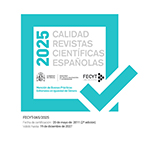Civic Humanism and the Classical Tradition in the Early Republic of Chile
Abstract
The first decades of the 19th century constituted a period of profound change for Chile, the principal results of which were to be seen in the consolidation of the process of independence from Spanish dominion in 1818. The consequences were not limited to a revolution of military and political nature; they also included a renovation of the cultural panorama -at least among the educated patriots who made an effort to distance themselves ideologically from the Monarchy-, with the implicit challenge of establishing a new order for Chile, based on legitimate and universally recognizable foundations. The inspirational framework for these efforts is usually associated with other revolutionary examples -France and the United States- that preceded the emancipation processes in Spanish America, as well as with the discourses of illustrated liberalism. As we will attempt to demonstrate in this study, a new reading of the texts written by the Creoles that lead the Chilean independence process may, nonetheless, also reveal the relevance of the classical tradition as a model for the configuration and legitimization of the first Republican projects that especially admired the ideals of Republicanism.Downloads
Article download
License
In order to support the global exchange of knowledge, the journal Revista Complutense de Historia de América is allowing unrestricted access to its content as from its publication in this electronic edition, and as such it is an open-access journal. The originals published in this journal are the property of the Complutense University of Madrid and any reproduction thereof in full or in part must cite the source. All content is distributed under a Creative Commons Attribution 4.0 use and distribution licence (CC BY 4.0). This circumstance must be expressly stated in these terms where necessary. You can view the summary and the complete legal text of the licence.











